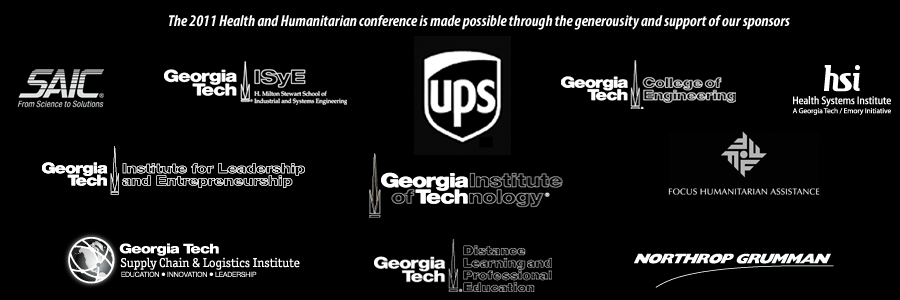Program
Below is the program for the 2011 conference. The 2010 and 2009 conference programs can be found at their respective websites.

![]() - PDF download available
- PDF download available
![]() - Zip file of all available presentations [19MB]
- Zip file of all available presentations [19MB]
![]() - A video archive of the session is available. To view the video, you will need to have Microsoft Silverlight installed.
- A video archive of the session is available. To view the video, you will need to have Microsoft Silverlight installed.
Thursday, March 3rd, 2011
| 7:30 - 8:30AM | Registration and Continental Breakfast |
|---|---|
| 8:30 - 10:45AM
|
Introduction & Welcome to the Conference Stephen Cross - Georgia Tech, EVP for Research |
| Panel Discussion: Logistics of Reducing Impact of Communicable Diseases Moderator: BJ Davis Rowe - Georgia Tech |
|
| 10:45 - 11:15AM | Break and Poster Session |
| 11:15 - 1:00PM
|
Panel Discussion: Delivering Solutions for Water and Sanitation Matthew Freeman - Emory University Moderator: Reginald DesRoches - Georgia Tech |
| 1:00 - 2:30PM | Working Lunch and Group Discussion (to be summarized on Friday) |
| 2:45 - 4:30PM
|
Panel Discussions: Technology to Improve Logistics Decisions Moderator: Michael Ross - Aidmatrix |
| 4:30 - 5:00PM | Poster Session |
| 5:00 - 8:00PM | Dinner/Reception |
Friday, March 4th, 2011
| 8:00 - 9:00AM | Registration and Continental Breakfast |
|---|---|
| 9:00 - 9:15AM | Summary of Group Discussions |
| 9:15 - 10:45AM
|
Panel Discussion: Preparedness to Prevent, Mitigate, or Improve Disaster Response and Recovery I Moderator: Cindy Hallberlin - Gifts In Kind International |
| 10:45 - 11:15AM | Break and Poster Session |
| 11:15 - 12:45PM
|
Panel Discussion: Preparedness to Prevent, Mitigate, or Improve Disaster Response and Recovery II Donald "Doc" Lumpkins - FEMA - National Preparedness Directorate Moderator: Cindy Hallberlin - Gifts In Kind International |
| 12:45PM | Concluding Remarks |
| 12:55 - 1:35PM | Lunch for Workshop Attendees |
| 1:35 - 2:00PM | Workshop Registration |
| 2:00 - 4:30PM | Concurrent Workshops (see below) |
Concurrent Workshops
Workshop A :: Managing Performance in Humanitarian Logistics (Instructor: Maria Rey, Senior Lecturer - Customized Programs, GTSCL and Executive Director, CELSC
In the for-profit logistics world, key logistics objectives are the maximization of profitability and customer satisfaction. In the humanitarian logistics space, in addition to minimizing cost while optimizing delivery times, the KEY concern is the impact of performance as a determinant of the survival of the affected population. Therefore logisticians have to manage a different set of rules when allocating inventory, deciding transportation modes, and selecting vendors or stocking locations. In addition to this complexity, most humanitarian organizations have a large set of stakeholders that care about the organization performance, thus complicating the designing of metrics when balancing the needs of donors, beneficiaries, suppliers and internal management. The objective of this workshop is to present participants with a proven framework to manage and measure performance in humanitarian logistics operations. We will review the parameters for metric design, will identify the appropriate metrics for logistics performance, and explore the management applications of performance measuring systems such as benchmarking, self-assessments, financial justification and project analysis. This workshop will be led by Maria Rey, expert in designing logistics and supply chain performance measurement systems and with experience in designing such systems in humanitarian logistics environments for organizations like WorldVision (Central America), Pan-American Health Organization (Washington, DC), FUSAL, MINCI (Colombia), and leading workshops like this for multiple humanitarian organizations' logistics operations as part of the Fritz Institute's Humanitarian Logistics Conference in Geneva.
Workshop B :: USACE Simulation and Modeling Program for Disaster Preparedness (Instructor: Steven Diaz, Deputy Director of the US Army Corps of Engineers (USACE), Readiness Support Center (RSC)
The US Army Corps of Engineers Readiness Support Center has developed a geospatial simulation tool (SIM Tool) for preparedness purposes that simulates impacts based upon the most valid and relevant modeling methodology, and displays them in a GIS viewer application. The Sim Tool contains scenario predictive information for hurricanes, earthquakes, and flood events modeled by simulation specialists and validated by professional and academic communities of practice through collaborative ventures. The program details impact information for social, economic, and critical infrastructure for hurricane, earthquake, and flood events. The program in its current iteration is used for preparedness in training and exercise venues to illustrate in a powerful way the points and issues of interest for planning and response readiness and strategic decision making. The Corps 5 year plan is to expand the database and program predictive capability to support a wider range of scenarios for both CONUS and OCONUS venues. The Sim Tool program and project lead is Dr. Steve Diaz of the USACE Readiness Support Center. The workshop session will provide an overview demonstration of the Tool and the way ahead for near and long term development.
Workshop C :: Technology at Work in Humanitarian Relief: Aidmatrix and UPSTrackpad Case Studies (Instructor: Chip Chappelle, Director of Humanitarian Supply Chain Logistics, UPS)
UPS actively supports multiple initiatives which provide benefit to the relief community. This workshop provides a holistic
description of three of these initiatives. First, the workshop will review the Aidmatrix International Portal, which provides
a technology platform for connecting donors, relief organizations, and transportation providers, such as UPS. Next, a
discussion of the Aidmatrix Warehouse Commodity Tracking System, that provides a low cost inventory management solution
for field NGO operations, will be held. Finally, a case study on the use of UPS Trackpad by Salvation Army during the
response in Haiti will be presented. In all cases, the workshop will include discussion about how NGOs are using the
technologies. Representatives from Aidmatrix, CARE, and The Salvation Army will be co-facilitators. The fee for this
workshop is waived thanks to sponsorship by UPS (while capacity is available).
